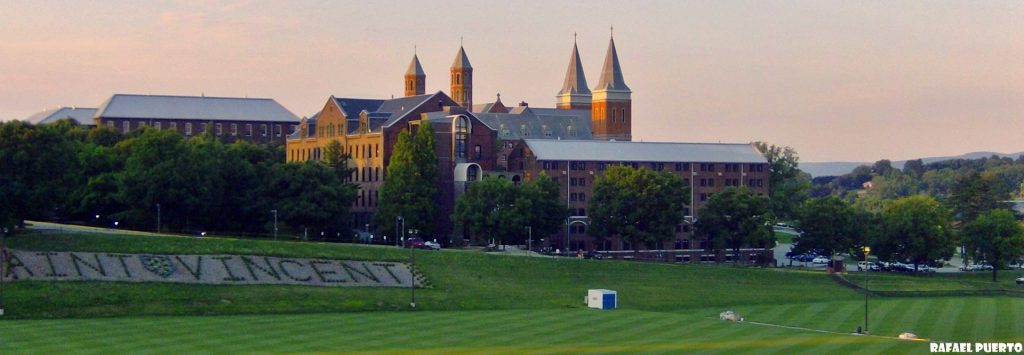By Mike Sabo
The opportunity to speak freely and openly – especially on controversial topics – is a cornerstone of civic education. But events that unfolded after the “Politics, Policy, and Panic: Governing in Times of Crisis” conference at Saint Vincent College demonstrate that freedom of speech at America’s institutions of higher education continues to stand on shaky footing.
Organized and hosted by Bradley C. S. Watson, director of the Center for Political and Economic Thought, the conference featured nine speakers, including former Trump White House science advisor Scott Atlas, political scientist Wilfred Reilly, and Johnny Burtka, president of the Intercollegiate Studies Institute. Over the span of two days, participants discussed a broad range of issues relating to the breakdown of public institutions and politics in the United States.
In a presentation provocatively titled “Black Privilege and Racial Hysteria in America,” Hillsdale College assistant professor David Azerrad argued against treating Americans differently due to their race. “I denounced all forms of preferential treatment for black Americans,” Azerrad said later about his talk, “and defended the core American principles of meritocracy and the rule of law – that is, the idea that desirable positions in the private sector should be awarded on the basis of competence and not skin color, and that all Americans should be equal before the law.”
Students vigorously debated Azerrad’s opinions, and he responded in turn. Conference participant Jacob Howland wrote of Azerrad’s presentation: “His frankness, precision, and patience in dealing with strongly worded objections and emotionally charged audience questions modeled a combination of intelligence, courage, and commitment to teaching and learning rarely found in academia.”
Since then, however, St. Vincent College has taken a series of actions that Watson calls “very disturbing.”
Letters by Gary Quinlivan, CPET’s co-director, and Saint Vincent president Father Paul R. Taylor denounced the conference and apologized to students. Quinlivan contended that Azerrad’s talk “may be interpreted as a form of invidious discrimination which inherently degrades the sanctity of human life.” The college initially prohibited the publication of all presentations, though a complete playlist was published on YouTube a few days later.
The center is being stripped of its independence, Watson says, “purportedly in response to a single speaker at that conference who gave an anti-affirmative action talk.”
CPET has now been placed under the authority of Jeffrey Mallory, Saint Vincent’s executive vice president and chief operating officer, who, Watson notes, has a background in diversity, equity, and inclusion. And going forward, President Taylor and his cabinet must approve all speakers in advance, which Watson argues will “have the effect of turning away the kind of independent-minded speakers we seek to attract.”
“What’s inexcusable is that the adults running the university would cower in fear before a handful of students, defame me, and impose an unprecedented policy to preapprove all speakers from here onward,” Azerrad states.
These are stark changes for CPET, which Watson calls “one of the oldest and most renowned collegiate centers of its kind in the nation.” It promotes the “foundations of the American constitutional order, including the political thought and history behind it – and the institutions generated by that thought and history.”
CPET offers lectures, annual conferences, scholarships, and the George Washington Fellowship, which gives accomplished undergraduates a chance to work with faculty on independent projects related to the “theme of citizenship, broadly conceived,” Watson says.
Civics is a particular focus of CPET, Watson notes. The center has hosted many speakers who have addressed how to reverse the decline of American civic education.
“It’s fair to say the center has been home to heterodox arguments – ones not commonly heard in academic institutions, due to the stranglehold of progressive orthodoxy,” Watson states. “The center has developed a national profile and has long ensured that – in the world of ideas – we fight well above our weight class. Of course, this also means that our woke colleagues don’t particularly like what we do.”
Watson says he has already seen a chilling effect from the administration’s actions.
“Major donors have already told us they’re withholding funds pending us sorting out center governance,” Watson reports. He also argues that Bibiana Boerio, a member of the college’s board of trustees, “licensed rage as a valid response to speech.” Boerio recently told of her fury over Azerrad’s presentation and the conference’s “extreme perspective.”
Watson himself received what could be interpreted as a death threat from a Saint Vincent alumnus, which he forwarded to the college’s president, counsel, and executive vice president, “asking if they would be as quick to condemn such obvious hatred as they were to condemn an invited speaker.” So far, he hasn’t gotten a response.
“The university is not supposed to be a safe space for ideas,” Azerrad argues. “If students are to be educated, rather than be indoctrinated; if they are to learn how to think, rather than have their prejudices confirmed, then they must be exposed to a broad range of ideas.”
“It is particularly important to make room for voices that defend the American creed of equality for all and special privileges for none.”
Originally published by RealClearEducation. Republished with permission.
More great content from School Reform News
